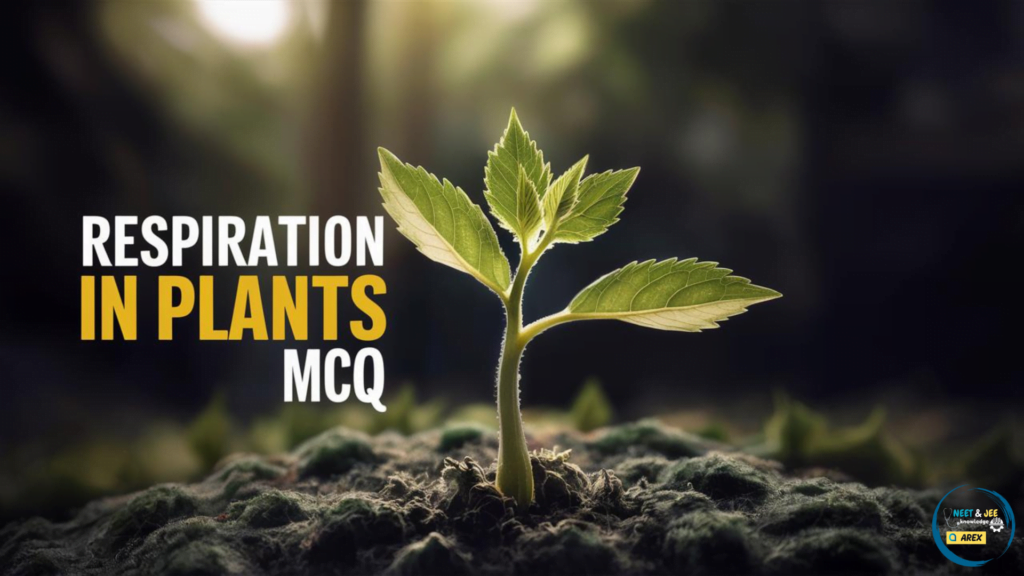
Respiration in Plants NEET Questions with Answers
Respiration in plants is the process by which they take in oxygen and release carbon dioxide to produce energy. This process occurs in every living cell of the plant, including roots, stems and leaves. The energy released during respiration is used for various functions like growth, repair and maintaining other life processes.
Unlike photosynthesis, which occurs only in the presence of light, respiration happens all the time, both day and night. Plants use glucose, which they produce during photosynthesis, as a fuel for respiration. The process primarily takes place in the mitochondria of the cells, where glucose is broken down into energy, water and carbon dioxide.
| NEET 2025 Exam Important Links | |
|---|---|
| NEET 2025 Updated Syllabus | How to read NCERT Biology for NEET |
| Biology Preparation | NEET Eligibility Criteria 2025 |
| NEET Preparation tips for 2025 | NEET Result 2024 |
Respiration in Plants NEET Questions with Answers
Respiration in plants is an important topic in the NEET syllabus as it explains how plants produce energy to carry out various life processes. This topic also connects with broader themes in biology, such as metabolism, energy cycles and plant physiology. Understanding this concept helps students grasp how plants convert glucose into energy through cellular respiration, which is vital for their growth, development and survival.
Respiration in Plants NEET Questions with Answers
All living organisms need \(\ldots A \ldots\) for carrying out daily life activities and is obtained by \(\ldots B \ldots\) of macromolecules.
The role of glycolysis is to produce energy (both directly and by supplying substrate for the citric acid cycle and oxidative phosphorylation) and various intermediate compounds, for biosynthetic pathway.
Enhance your preparation with Arexiq’s Mock Test Series where we provide solutions to various MCQs like we provide in this post “Respiration in Plants NEET MCQ”. Our expert teachers explain the concepts thoroughly, making it easy for you to understand. We offer many types of questions ensuring a clear grasp of concepts.
FAQs
- What is respiration in plants?
Answer: Respiration in plants is a metabolic process where they break down glucose to produce energy in the form of ATP. This process occurs in the mitochondria and involves both aerobic (with oxygen) and anaerobic (without oxygen) pathways. - How does respiration in plants differ from photosynthesis?
Answer: Respiration is a catabolic process that releases energy by breaking down glucose, while photosynthesis is an anabolic process that uses sunlight to synthesize glucose. Respiration occurs in all cells all the time, whereas photosynthesis occurs only in chlorophyll-containing cells during daylight. - What are the types of respiration in plants?
Answer: Plants undergo two types of respiration:
- Aerobic Respiration: Occurs in the presence of oxygen and involves the complete oxidation of glucose into carbon dioxide, water and energy (ATP).
- Anaerobic Respiration: Occurs in the absence of oxygen, leading to the partial breakdown of glucose into ethanol or lactic acid and a smaller amount of energy.
- Why is respiration in plants included in the NEET syllabus?
Answer: Respiration in plants is included because it is a fundamental biological process essential for energy production and life processes in plants. Understanding it helps students connect plant physiology with overall biological concepts. - How can I prepare for questions on respiration in plants for NEET?
Answer: To prepare, focus on understanding the mechanisms of respiration, the differences between aerobic and anaerobic respiration and the role of cellular organelles like mitochondria. Practice questions from past papers to solidify your understanding.


